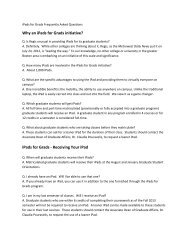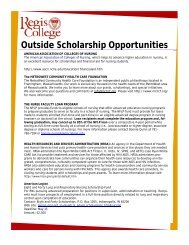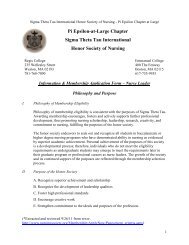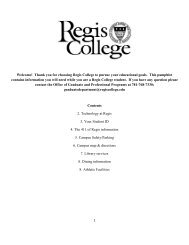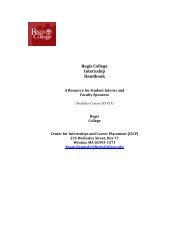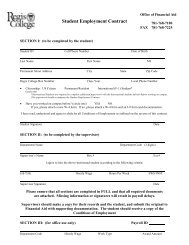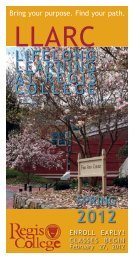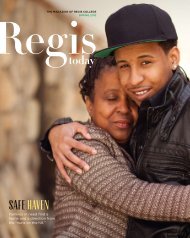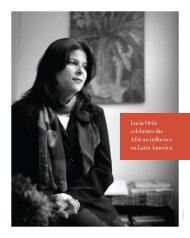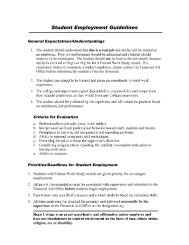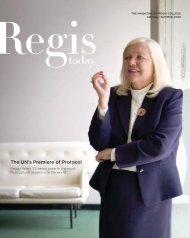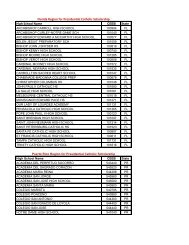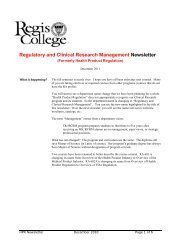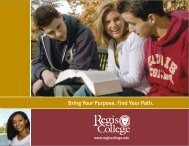2010-11 Academic Catalog Addendum - Regis College
2010-11 Academic Catalog Addendum - Regis College
2010-11 Academic Catalog Addendum - Regis College
- No tags were found...
Create successful ePaper yourself
Turn your PDF publications into a flip-book with our unique Google optimized e-Paper software.
R E G I S C O L L E G ENOVEMBER 20<strong>11</strong>UPDATETO THEacademic catalog<strong>2010</strong>–20<strong>11</strong>click to open<strong>Academic</strong> <strong>Catalog</strong><strong>2010</strong>–20<strong>11</strong>B r i n g Y o u r P u r p o s e . F i n d Y o u r P a t h .
click to open<strong>Academic</strong> <strong>Catalog</strong><strong>2010</strong>–20<strong>11</strong>
November 20<strong>11</strong> Update to the <strong>Academic</strong> <strong>Catalog</strong> <strong>2010</strong>–20<strong>11</strong>October 20<strong>11</strong>Update to the<strong>Regis</strong> <strong>College</strong> <strong>Academic</strong> <strong>Catalog</strong>AY 20<strong>11</strong>–2012Page numbers refer to the <strong>Academic</strong> <strong>Catalog</strong> <strong>2010</strong>–20<strong>11</strong>. Only substantive additions or changes are listed;deletions are usually not indicated. New course are so labeled.p.2Antoinette M. Hays, PhD, RNPresidentp. 2President’s Message<strong>Regis</strong> <strong>College</strong> has a rich history of educatingstudents who succeed in a complex, changingworld. We offer the full range of degrees fromthe associate and bachelors to the master’s anddoctorate, and all degree programs are open toboth women and men. Our undergraduate enrollmenthas been growing, and <strong>Regis</strong> is a leaderin graduate program innovation.p. 2Here you will be encouraged to think acrossthe disciplines and become a positive influenceon society. Today, you are a student challengingyourself intellectually. Tomorrow, you willhave strengthened your knowledge and talentsso that, wherever you go on the globe, you canbring your insight and skill to those who need it.p. 5HISTORY(Second Paragraph)In the first decade of this century, <strong>Regis</strong> <strong>College</strong>has itself walked a path of transformation.In January 2007, <strong>Regis</strong> began offering its firstdoctoral program (the DNP or Doctorate ofNursing Practice). In September 2007, <strong>Regis</strong><strong>College</strong> officially and seamlessly made the co-edtransition and opened its doors to men as wellas women undergraduates. In 2008, the <strong>Regis</strong>faculty strengthened the core curriculum at <strong>Regis</strong>through a major revamping. For 2008–20<strong>11</strong>,and again for 20<strong>11</strong>–2015, <strong>Regis</strong> has been renameda Center of Excellence in Nursing Educationby the National League of Nursing—oneof the first nursing programs in New Englandto be so designated. In 2009–<strong>2010</strong>, the <strong>College</strong>built aesthetically pleasing, state-of-the-art athleticfields on its north side. And in <strong>2010</strong> thecollege began implementing ten interdisciplinaryPathways of Achievement to guide all whostudy here—graduate and undergraduate studentsalike—through various arts and sciences tothe realization of their academic and professionalgoals. Bring your purpose and find your path at<strong>Regis</strong>. We will meet you on your way.p. 7Social Work Program is accredited by the Councilon Social Work Education. The Nursing Programsare accredited by the National Leaguefor Nursing Accrediting Commission (3343Peachtree Road NE, Suite 500, Atlanta, GA30326 phone 404-975-5000 www.nlnac.org.)The Medical Radiography program is accreditedby the Joint Review Committee on Educationin Radiologic Technology (JRCERT, 20 N.November 20<strong>11</strong> Update to the <strong>Academic</strong> <strong>Catalog</strong> <strong>2010</strong>–20<strong>11</strong><strong>11</strong>
November 20<strong>11</strong> Update to the <strong>Academic</strong> <strong>Catalog</strong> <strong>2010</strong>–20<strong>11</strong>p. 24FINANCIAL AID for undergraduate students<strong>Regis</strong> <strong>College</strong> offers many types of financialaid. Students may be awarded scholarshipfunds or one of the federal and state programsin which the college participates. Federal programsinclude the Federal Pell Grant, FederalSupplemental Educational Opportunity Grant(FSEOG), Federal Perkins Loan, Federal DirectLoan, and Federal Work-Study (FWS). Stateprograms for Massachusetts residents includethe Massachusetts State Grant, and the GilbertGrant. Residents of other states may qualify forthe scholarship program specific to their state. Astudent may receive financial assistance from oneor a number of these sources, as eligibility andfunding allow.p. 26FINANCIAL INFORMATION for undergraduateStudentsTuition, Fees, and Other Charges*All current tuition and fees can be found on the<strong>Regis</strong> <strong>College</strong> website at http://www.regiscollege.edu/_costs_financialaid/undergraduate.cfm.p.26Billing Policies and ProceduresUndergraduate semester bills for the academicyear commencing in September are available onyour <strong>Regis</strong> Access account in June with a duedate of early August for the fall semester, and inNovember with a due date of mid-December forthe spring semester. Extended Learning bills areavailable on your <strong>Regis</strong> Access account in Junefor the fall semester and in December for thespring semester. The exact due date is shown onthe billing statements. Summer session tuitionand fees are due upon registration.No student is eligible to attend classes or tolive in the residence halls unless charges owedare paid by the due date specified on the bill orunless alternative payment arrangements havebeen made with the Bursar’s Office. Failure tosettle accounts in full, at any time, may preventthe student from receiving a transcript of gradesor a degree. In addition, other services may betemporarily or permanently suspended. A student’sregistration is subject to cancellation ifthe charges for a semester or session are not paidaccording to the stated policy.Undergraduate tuition and room and boarddeposits, required annually, are due April 1 forcontinuing students and May 1 for incomingfirst-year students and transfer students. Thesedeposits are applied to each semester’s tuitionbill. A one-time security deposit is due from allfull-time undergraduate students upon enteringthe <strong>College</strong> and will be refunded followinggraduation.p. 27Payment Policies and ProceduresStudent account bills may be paid in one of thefollowing ways:Online @regiscollege.edu/current_student/index.cfm.This is an internet portal through ourthird party payment partner, Official Payments.Lockbox payments at the address given below:<strong>Regis</strong> <strong>College</strong>C/O Century BankElectronic ServicesPO Box 87Medford, MA 02155Electronic Funds Transfer (EFT). Individualswishing to make payments by EFT must contactthe Office of Student Accounts at 781-768-7206to obtain appropriate banking information.In Person. The Office of Student Accounts isavailable to accept payment in the form of cash,Check, or debit/credit cards. We accept the followingcards: VISA, MasterCard, American Express,and Discover.Students may view their account bills anytime on<strong>Regis</strong> Access. Students assume the full responsibilityfor payment of their account with <strong>Regis</strong><strong>College</strong> and for any and all cost incurred by the<strong>College</strong> to collect payments; including late fees,collection costs and legal fees.p. 28Statement of AccountFor the convenience of students, financial aidwhich has been tentatively awarded by the Officeof Financial Aid is shown in an EstimatedAid section of t he Statement of Account and isdeducted from the balance due on the presumptionthat the amount listed will be received indue course by the <strong>College</strong>. If the student wasawarded financial aid and it does not appear onthe bill, this means the aid has not been completelyprocessed and cannot be officially appliedto the bill. In that instance, the bill may be sub-4
ject to an assessment of late payment charges ifnot resolved in a timely manner. The studentshould immediately contact the Office of FinancialAid to determine the statue of aid awardedshould it not appear on the Statement of Account.Federal Work Study or Institutional workawards are wages to be earned at a future dateand do not appear on the student bill.Certain types of aid when actually applied by the<strong>College</strong> may differ from the estimated aid on thebill. For example, the financial aid award maychange if the student decides to change fromresident to commuter status or when a studentchanges from full-time to part-time enrollment.Should this occur, revised financial aid amount,if any, will be reflected on the next billing.p. 32ACADEMIC ADVISING & Student SuccessServicesStudent Success CenterThe Student Success Center provides for theacademic support needs of all <strong>Regis</strong> students.The Student Success Center offers a variety ofservices to assist both undergraduate and graduatestudents in achieving their academic goals.The Writing Center—Professional Writing Tutorand Peer Writing AssistantsSmarthinking Online Tutoring ServicesProfessional Math tutorsPeer Tutors and Peer Mentors (for undergraduatestudents only)Mini-Versity <strong>Academic</strong> Skills WorkshopOffice of Experiential Learning and Career DevelopmentDirector of Student Disability ServicesLearning SpecialistAdvisor to International Studiesp. 33Experiential Learning & Career CenterIndividual career counseling sessions with professionalstaffCareer development services include career andself exploration, skill development, strategicplanning, graduate school and employment research,and professional networking.Internship program providing students with opportunitiesto gain practical experience in a varietyof fields while receiving academic credit.Job listing of full-time, part-time and summeremployment in the private, public, and nonprofitsectors.Job search assistance focusing on resume andcover letter writing, networking, interviewing,and strategies for job searching.Graduate school advising and assistance with theapplication process.Off-campus teacher job fair attended by schoolpersonnel from across the country.Throughout the year, the ELCC is open Mondaythrough Friday, 9:00 a.m.–5:00 p.m.p.34Affiliations with Health-Care FacilitiesThe <strong>Regis</strong> Nursing Programs offer a wide varietyof health-care settings where students mayobtain enriching clinical experiences appropriatefor their educational and professional goals.Students are placed in acute, sub-acute, andlong-term care facilities; nurse-managed clinicsin homeless shelters; elementary and secondaryschools, visiting nurse associations and elderlyand low-income housing in both urban andsuburban settings. Qualified nurse practitionerstudents have the opportunity to complete aportion of the clinical requirements in approvednational or international settings.p. 42STUDENT Community LifeCampus Network and Internet ServicesThe campus network provides access to campusapplications and the Internet. Wireless access isavailable throughout the library, in all dormsand in most common areas on campus. Networkports are available in all offices, residence halls,computer labs and the library. Residents usingpersonal computers will have access to the campusnetwork and the Internet in their residencehall rooms through both network ports andwireless access.Three <strong>Regis</strong> accounts are available for every student(a network login and email, <strong>Regis</strong>Access,and Moodle) enabling extensive use of <strong>Regis</strong><strong>College</strong>’s technology resources.Faculty, staff and students are responsible forreading and adhering to the <strong>College</strong>’s TechnologyEthics and Privacy Agreement posted athttp://www.regiscollege.edu/administration/ethics_privacy_agreement.cfm.November 20<strong>11</strong> Update to the <strong>Academic</strong> <strong>Catalog</strong> <strong>2010</strong>–20<strong>11</strong>5
November 20<strong>11</strong> Update to the <strong>Academic</strong> <strong>Catalog</strong> <strong>2010</strong>–20<strong>11</strong>Use of <strong>College</strong> technology accounts constitutesacceptance of the terms of the TechnologyAgreement.p. 42Commuter Student Services<strong>Regis</strong> provides an abundance of activities andsupport services for commuter students. TheCommunity Life Department plans social eventsand hosts a series of Commuter Luncheonsthroughout the year. Lounges, mailboxes are allavailable to commuting students. Many commutersform car pools; others use the <strong>Regis</strong>shuttle, which provides regular transportationto Riverside station. Commuters are encouragedto take advantage of all that the <strong>College</strong> has tooffer.p. 44<strong>Regis</strong> <strong>College</strong> Student OrganizationsListed below are just some of the ways for studentsto become involved in the <strong>Regis</strong> <strong>College</strong>community. If you are interested in starting anew club or organization, stop by the StudentActivities Office in St. Joseph Hall, Room 219,x7049AAA (Asian American Association)ALANA (African-American, Hispanic, Asian,Native American Association)Black Student OrganizationCampus Activities BoardCampus MinistryClass OfficersCVSA (Cape Verdean Student Association)Commuter Student AssociationDance CompanyDynasty Step AssociationEducation ClubGay-Straight AllianceGlee ClubGNSO (Graduate Nursing Student Organization)Gospel ChoirHASO (Haitian American Student Organization)Hemetera Literary MagazineInstrumental EnsembleLASO (Latin American Student Organization)Model United NationsMount <strong>Regis</strong> (Yearbook)Orientation StaffPsychology ClubRed Cross Club<strong>Regis</strong> <strong>College</strong> Theatre ClubRHA (Residence Hall Association)RSNA (<strong>Regis</strong> <strong>College</strong> Student Nursing AssociationSAAC (Student Athlete Advisory Committee)Science ClubSGA (Student Government Association)SUSS (Students Uniting for Social Services)Tower Society (Student Ambassador Program)WRGS (<strong>College</strong> Radio Station)p. 46The MajorAddedMedical Imaging, with tracks inNuclear Medicine Technology & DegreeCompletion Program (for certified technologists)p.47UNDERGRDUATE PROGRAMSGeneral informationBaccalaureate Degree Requirements<strong>Regis</strong> <strong>College</strong> offers a baccalaureate programof study leading to the Bachelor of Arts degree,Bachelor of Science degree, and Bachelor of SocialWork degree. Most students complete thedegree in four years.The baccalaureate degree is conferred upon candidateswho have satisfactorily completed a minimumof 120 semester credit hours, with a cumulativegrade-point average of at least 2.00 andwho have completed the requirements for a majorfield, as well as the General Education Programrequirements. Certain programs, such asNursing, Nuclear Medicine Technology, SocialWork, and Elementary and Secondary TeachingLicensure Programs, require the student to earna higher GPA.A normal course load for a full-time student is…6
p. 47Heritage and FoundationRevision: FIRST-YEAR SEMINAR: by completinga one-semester course (RC 101; 3 credits).Application and IntegrationCore Capstone Experience (1 credit hour)p. 48Students pursuing the Bachelor of Science inNursing fulfill this require ment by completingSP 100 Spanish for Health Professionals or PG100 Portuguese for Health Professionals.UNDERGRADUATE: New or RevisedCoursesp.52Revised description:First-Year SeminarThe <strong>Regis</strong> <strong>College</strong> First-Year Seminar course is asignature component of a <strong>Regis</strong> <strong>College</strong> educationand a cornerstone for advanced study. TheSeminar is a multi-section course with a commonsyllabus and common activities that involveall first-year students and <strong>Regis</strong> faculty. It meetstwice a week for one hour and fifteen minutes,and receives three credits.p.55BIOCHEMISTRYMAJORRequired for the MajorThe following core courses are required for themajor. For a complete description of each course,see the course offerings in Biology, Chemistry,Mathematics, and Physics. Bi 209, 210, 307; Ch103, 104, 305, 306, 307, 313, 315, 316; MA101; PY 213; two seminars: BI 404 or Ch 404and a second seminar selected from the Biologyor Chemistry seminar offerings; one upper-levelelective from courses in Biology or Chemistry.For students planning graduate work in Biochemistry,additional work in mathematics andphysics is strongly recommended.p.55Michael Bilozur, Co-ChairpersonMary Lombard, Co-ChairpersonElizabeth KilpatrickAmy KnappAnne PowersVerna-Ann Power-Charnitskyp.58MINORCHEMISTRYCOURSE DESCRIPTIONSCH 101: Prerequisite: MA 100 or able to enrollin MA 101, MA 105, MA 210, or MA 2<strong>11</strong>.CH 103/CH 104: Prerequisite: MA 100 or ableto enroll in MA 101, MA 105, MA 210, or MA2<strong>11</strong>.CH 105: Prerequisite: MA 100 or able to enrollin MA 101, MA 105, MA 210, or MA 2<strong>11</strong>.p.58MINORCHEMISTRYCOURSE DESCRIPTIONSCH 308 Deleted line. (Not offered <strong>2010</strong>–20<strong>11</strong>academic year)CH 309 Deleted line. (Not offered <strong>2010</strong>–20<strong>11</strong>academic year)CH3<strong>11</strong> Deleted line. (Not offered <strong>2010</strong>–20<strong>11</strong>academic year)p.64UNDERGRADUATE COURSE DESCRIPTIONECONOMICSNew Course: EC 304: History of EconomicThoughtThis course is a survey of the evolution of economicideas. Economic theories and policies willbe related to the socioeconomic and intellectualclimate of their times. Major economic thinkersfrom Adam Smith to current mainstream economistswill be studied as well as economists criticalof their ideas. Prerequisites: EC 201 or EC 202p66EDUCATIONNew Course: ED 315: Content Area ReadingInstruction: Middle/Secondary SchoolThis course is designed to develop understandingof literacy teaching and learningfor studentsin middle and secondary school programs. Thecourse will focus on increasing student performancein content areas by understanding andNovember 20<strong>11</strong> Update to the <strong>Academic</strong> <strong>Catalog</strong> <strong>2010</strong>–20<strong>11</strong>7
Elizabeth ConantWendy CookJacqueline GentileNate HagerMichael KotchJulie PlantLori Wassermanp. 74HISTORYNew Course: HI <strong>11</strong>3: Pestilence andPeople: History and Social Consequences ofEpidemicsThis course will demonstrate how studying anepidemic can provide insights into the nature ofa specific society. Themes will include the extentto which epidemics act as agents of social, economic,religious and political change, the organizedpublic health response to each epidemic,and the development of medical therapeuticsand technologies. It will also provide a historicalperspective from which to consider the expectationsthe lay public now has for health professionalsto contain today’s epidemics.p. 76New Course: HI 388: Special Topics in HistoryThis course is designed to offer special topics inhistory at the upper level. It will be offered onthe basis of necessity and faculty availability.p. 77INTERDISCIPLINARY COURSESNew Course: ID 214: Environmental Studies:People, Planet, ProsperityThis course takes an interdisciplinary approachto the study of how we interact with and impactour natural environment. Students will integratedifferent concepts and perspectives from thehumanities, social sciences, and natural sciences,providing a framework for the study of therelationship between humans and the environment.The course will demand from students abalanced understanding of basic scientific concepts,important societal factors (cultural, political,and economic), and the historical and ethicaldimensions that influence our decision making,and ultimately, the fate of our planet. A servicelearningproject will allow students to explorecurrent environmental challenges (e.g., climatechange, sustainable agriculture, overfishing,etc.) and seek innovative solutions designed tobring about environmental sustainability for ourcampus, our communities, and the world.p. 77Restored Course: ID 220-07 Animals in WorldLiteratureThis course focuses on the various ways in whichanimals appear in literature from an eco-criticalperspective. Selected writings will focus on poetryand prose, short stories and novels. Worksstudied will be by authors such as Aesop, LaFontaine, Flaubert, T.S. Eliot, T. Morrison, B.Kingsolver, J. Cortázar, M. Denevi, and others.p.77New Course: ID 236: IntroductoryAstronomyThis course introduces students to the fundamentalaspects of the history, philosophy, andscience of the astronomical universe. It willprovide students an opportunity to learn andappreciate the world of Astronomy and how itrelates to their other studies, their careers, andtheir lives as citizens and professionals. Studentswill discover the phenomena of our solar systemand beyond—planet and moons, asteroids andmeteors, stars and black holes, constellations andgalaxies and several other phenomena. Prerequisites:EN 105; MA 100 or above.p. 79MANAGEMENT LEADERSHIPNew Course: MT 250: Principles of FederalTaxationThis course introduces students to a broad rangeof tax concepts and types of taxpayers, particularlywithin a framework of financial accounting.The role of taxation in the business decisionmakingprocess is emphasized. The student isexposed to professional standards and ethics;and learns to do basic tax research and tax planning.This course gives an understanding of theinterrelationship and differences between financialaccounting and tax accounting. Also consideredis the distinction among for-profit, not-forprofit, and governmental accounting entities,and the history of the Internal Revenue Code.November 20<strong>11</strong> Update to the <strong>Academic</strong> <strong>Catalog</strong> <strong>2010</strong>–20<strong>11</strong>9
November 20<strong>11</strong> Update to the <strong>Academic</strong> <strong>Catalog</strong> <strong>2010</strong>–20<strong>11</strong>p. 81p. 80MATHEMATICS AND COMPUTER SCIENCEAdditional faculty in Mathematics:Helen KimRobert Gallagherp. 81Revised Description: MA 210: StatisticsBasic principles of statistics, including descriptivemethods, hypothesis tests, estimation, correlationand regression, analysis of variance andChi-square test of independence. Emphasis onapplications. Prerequisite: C- or better in MA100 or satisfactory score on Accuplacer.Bachelor of Science Medical ImagingBachelor of Science in Medical ImagingDavid Gilmorep. 81Change in Course Number: MA 220: DiscreteMathematics (formerly MA <strong>11</strong>0)Introduction to discrete mathematical tools usedin computer science. Topics include set theory,elementary logic, combinatorics, graphs, trees,induction, and recursion. Required for thiscourse is a working knowledge of algebra andelementary functions. Prerequisite: C- or betterin MA 100 or satisfactory score on Accuplacer.Nuclear Medicine ProgramThis is a collaborative program developed by <strong>Regis</strong> <strong>College</strong> and the Beth Israel Deaconess Medical Center. Itis one of several program options in development in the Medical Imaging Program.Curriculum Plan for Nuclear MedicineYEAR 1Fall:Spring:EN 105 Writing Seminar I 3 EN 106 Critical Reading, Writing, Think. 3BI 105 Anatomy & Physiology I 4 BI 106 Anatomy & Physiology II 4SO 201 Intro to Sociology 3 MA 210 Statistics 3RC 101 First Year Seminar 3 RC 102 First Year Seminar* 3MA 101 Intro Calculus 3 SP 100 Spanish for Healthcare Prof. 316 16* RC 102 for class 2014 only // Elective for all othersYEAR 2Fall:Spring:CH 105 Chemistry Intro 4 PY 214 Physics II 4PY 213 Physics I 4 _____ Social Science Course 3_____ Philosophy Course 3 _____ Religion Course 3BI 108 Microbiology 4 _____ History Course 315 _____ Literature Course 31610
YEAR 3Fall:Spring:MI 402 Nuclear Medicine Essentials 3 MI 472 Radiopharmacy & Pharmacology 2MI 460 Nuclear Med. Procedures & Technology 6 MI 470 Cross Sectional Imaging 3MI 465 Radiation Sciences & Instrumentation 3 MI ___ Molecular Imaging 3ID 304 Exploring Ethics 3 MI 468 Clinical Education I 215 MI ___ Nuclear Cardiology 313YEAR 4Fall:Spring:MI 471 Nuclear Medicine Critique 4 MI ___ Nuclear Medicine Seminar/Capstone 5MI 469 Clinical Education II 4 MI ___ Clinical Education III 4MI ___ Research Methods 4 MI 650 Pathology Across Rad. Mod.* 3____ Elective 3 NU 618 Health Policy* 315 15* Serves as graduate credit for MS programsTotal: 121 Creditsp. 81Courses Added /RevisedMEDICAL RADIOGRAPHYREVISED COURSE DESCRIPTIONSMR 100 Introduction to RadiologicTechnology and Lab (3 Credits)The general goal of this course is to assist thestudent to become familiar with the basic medicalterminology; procedures, settings and patientcare skills associated with the profession of MedicalRadiography. A combination of lectures,guided self-study, guest lecturers and laboratoryexperiences will assist the student to develop allcognitive, affective and psychomotor skills prerequisiteto safely and efficiently enter the clinicalenvironment. This course will be presented inthe 3 weeks prior to the students matriculatingin the remainder of the First Semester’s Septembercourse load.MR 101 Radiologic Procedures & RelatedAnatomy I and Lab (3 Credits)In this first of a series of three courses, studentswill learn how to safely and efficiently move/manipulate typical types of radiographic andfluoroscopic equipment, locks and accessories.The student will also study the anatomic structures/organsassociated with; and the standardbody/part positions, which are fundamentalto the performance following exams: Commonlyperformed views of the Chest; Abdomen;Routine Upper Extremity; and Routine LowerExtremity. Learning activities will include classroompresentation, guided self-study exercises,demonstration, and practice. Student first levelperformance competency will be evaluated inthe lab setting. There will be two 2-hour lecturesand one 4-hour lab per week for the first7.5 weeks of the semester.MR <strong>11</strong>1 Radiologic Imaging I and Lab (3Credits)In this, an introduction to the art and science ofmedical imaging, students will learn the basic elementscommon to all forms of medical imagingutilized in Radiology Departments today. Principles,concepts and applications of Signal Theorywill be studied within the framework of film/screen and digital/computed radiologic imagingas well as fluoroscopic imaging. A general, introductoryapplication of signal theory to ComputerizedTomography, Medical Sonography, MagneticResonance Imaging and Nuclear MedicineImaging will also be presented. Exposure factormanipulation, equipment utilization, and concomitanttheoretical foundations relevant to theproduction various degrees of Radiologic Density/Brightnesswill be studied. Manipulation ofthese factors and associated equipment withinstructured Laboratory exercises will assist thestudent in the application of their learning to theproduction of consistent, quality images. Therewill be two 2-hour lectures and one 4-hour labper week for the second 7.5 weeks of the semester.November 20<strong>11</strong> Update to the <strong>Academic</strong> <strong>Catalog</strong> <strong>2010</strong>–20<strong>11</strong><strong>11</strong>
November 20<strong>11</strong> Update to the <strong>Academic</strong> <strong>Catalog</strong> <strong>2010</strong>–20<strong>11</strong>MR <strong>11</strong>2 Radiologic Imaging II and Lab (3Credits)This Continuation of study of the principles,factors and practices associated with the productionof medical radiographic images which beganin MR <strong>11</strong>1, will include a further analysisof the production/creation/manipulation ofradiographic density/brightness plus a detailedanalyses of factors producing radiographic contrastand detail/spatial resolution. Methods of“Image Archiving” and PACS transmission willalso be studied. Laboratory exercises employingfilm/screen, Computed Radiography and DirectDigital Radiography, will assist the student in application,manipulation and adjustment of thefactors studied, with the goal being to produceconsistent, quality images. There will be two2-hour lectures and one 4-hour lab per week forthe second 7.5 weeks of the semester.MR 120 Radiologic Clinical I (3 Credits)Starting with a formal orientation to the students’assigned clinical site, students will progressas follows: a) structured observational experiencesb) guided clinical application/practiceof skills associated with procedure performancec) competency assessment and d) post clinicalcompetency assessment continued performance/practiceof the Radiologic Exams studiedin Radiologic Procedures & related Anatomy Iand lab. Students will be given performancebenchmarks as guidelines as they develop confidenceand competence in the performance ofselected Radiographic exams. There will be two7.5 hour clinical preceptorship days per week for15 weeks.MR 121 Radiologic Clinical II (3 Credits)Students will continue to develop confidence inthe performance of those radiographic exams incorporatedwithin the First Semester’s study. Inaddition, students will follow the progression ofpractical application learning activities describedin MR 120, associated with the radiologic examsstudied in MR 102. Students will be givenperformance benchmarks as guidelines as theydevelop confidence and competence in the performanceof selected, related Radiographic (andin selected cases, Fluoroscopic and bedside/portable) exams. There will be two 7.5 hourday clinical preceptorship days per week for 15weeks. Clinical conferences / critique sessionswill be incorporated.MR 131 Radiologic Physics (3 Credits)An initial unit of study of the fundamental theoriesand principles relevant to classical, NewtonianPhysics, will be followed by a conceptuallybased study of atomic structure, electricity, magnetismand electromagnetism. In addition, studentswill study the physical principles relevantto: (a) the function/operation of X-Ray generatingequipment; (b) five of the interactions of x-radiation with matter; and (c) Radioactive Decayprocesses. Correlations between the principleslearned and procedures/practices involved withthe production of radiographic images will alsobe studied. There will be 3 hours of lecture perweek for 15 weeks.MR 201 Radiologic Anatomy with RelatedProcedures III and Lab (3 Credits)In this third and last of the Procedures andAnatomy series of courses, students will learnthe gross and topographic anatomic structuresas well as relevant body positions and sequenceswhich are associated with more advanced RadiographicExams of the cranium, EmergencyRoom Radiography and Genito-Urinary Imaging.Concurrently, the routine body positionsrequired to obtain routine Radiographic imagesfor these exams will be practiced and evaluatedwithin laboratory sessions. In addition, studentswill be presented the anatomy and positioningviews associated with Mammography. A reviewof exams covered in prior semesters will also occur.Presentation of a self produced case studyand a self produced, self-critiqued video-tape oftheir performing and describing selected studiesare course requirements. There will be two2-hour lectures and one 4-hour lab per week forthe first 7.5 weeks of the semester.MR 2<strong>11</strong> Radiologic Imaging III and Lab(3 Credits)This culmination of the study of those principles,factors and practices which are associated withthe production of medical radiographic imageswill focus on students synthesizing and combiningall principles and practices covered in theprior two semesters. Emphasis will be placedon students adopting a coherent, comprehensiveapproach to the development of a technical,imaging protocol system. Laboratory exerciseswill assist the student in application of the factorsstudied to produce consistent, high qualityimages. In addition, students will study the generaloperation/function of CT and MRI equipment.There will be two 2-hour lectures andone 4-hour lab session, along with a numberof student determined, additional “open-lab”12
hours per week, for the second 7.5 weeks of thesemester.MR 220 Radiologic Clinical III (3 Credits)The Summer starts with an intensive, one-totwoweek academic and lab component focusingon learning:(a) the anatomy and positioningfor selected views associated with cranial imagingand (b) the anatomy and performance ofVenipuncture for the purpose of contrast agentadministration. Following this, students will beengaged in a ten week, 7.5 hour per day, five dayper week clinical preceptorship. This intensiveexperience will help students develop a higherlevel of performance competency and efficiencyin the exams covered during the freshman yearas well as the performance of the cranial studiescovered in class/lab. Students will be expectedto emphasize their demonstrating progressivelyincreasing levels of organizational skill, performancespeed and accuracy as they progressthrough the semester. There will be five 7.5hour day clinical preceptorship days per week for<strong>11</strong> weeks. Clinical conferences/critique sessionswill be incorporated.MR 221 Radiologic Clinical IV (3 Credits)Students will continue to develop confidencein the performance of those radiographic examswhich were incorporated in the prior threesemester’s study. In addition they will progressfrom structured observational experiencesthrough guided clinical application of procedureperformance skills to assessment and achievementof appropriate clinical competency in theperformance of those Radiologic Exams studiedin Radiologic Procedures & Related AnatomyIII and lab. Students will be given performancebenchmarks as guidelines as they further developin confidence and competence in the performanceof Radiographic studies. Gaining practicein exams which are commonly performed withinthe Emergency Room/Urgent Care setting, aswell as observational experiences in MRI andCT, may also be included. There will be three7.5 hour day clinical preceptorship days perweek for 15 weeks. Clinical conferences/critiquesessions will be incorporated.MR 222 Radiologic Clinical V (3 Credits)Students will be expected to exhibit the levelconfidence in the performance of all radiographicexams which were incorporated in the priorsemester’s academic and clinical study associatedwith the program’s criteria for “Exit Level Competency”.Students will also present a portfolio,which demonstrates their performance in theclinical environment for the past four semesters.There will be three 7.5 hour day clinical preceptorshipdays per week for 15 weeks. Clinical conferences/ critique sessions will be incorporated.MR 231 Radiation Biology and Protection (3Credits)After a brief review of the atomic and molecularphysical principles covered in MR 131, a study ofthe fundamental biological principles relevant tothe manifestation of biologic effects from radiationexposure will occur. This will be followed bystudy of these effects on the atomic, molecular,cellular, tissue, organ and organism level. In addition,students will study the principles relevantto: the basic radiation safety practices; the safetyregulations promulgated by state and federalagencies; and the general design considerationsrelevant to Radiology Facilities. Students willalso present a portfolio of “critical analysis essays”they have been working on throughouttheir matriculation in the program.MR 240 Advanced Radiologic Procedures (3Credits)Selected exams in Cardiovascular/Peripheral-Vascular Imaging and Interventional Radiologywill be studied. In addition, students will learnthe fundamentals elements of Body SectionalImages in the Axial, Coronal and Sagittal planes.Lastly, students will engage in an intensive reviewof all material covered in prior semestersfollowed by comprehensive performance testing,with established minimum acceptable criteria, inthose materials. Resume writing and job interviewingskill development will also be addressed.The course will run for 15 weeks and will consistof a combination of classroom sessions, computerlab exercises, home study assignments andguided self-study exercises.MR 250 Radiologic Pathophysiology (3Credits)In this course, common radiologic findings relatingto those exams which were covered duringthe prior semesters will be presented. Basicpathophysiologic processes relating to thosefindings will also be covered. Emphasis will beplaced on the student’s ability to increase theirproficiency in assessing the diagnostic completenessof the images they produce. A combinationof guest lectures from Radiologists, guided selfstudy exercises and class room discussions willrun for two hours per week for 15 weeks.November 20<strong>11</strong> Update to the <strong>Academic</strong> <strong>Catalog</strong> <strong>2010</strong>–20<strong>11</strong>13
November 20<strong>11</strong> Update to the <strong>Academic</strong> <strong>Catalog</strong> <strong>2010</strong>–20<strong>11</strong>p. 86NURSINGPenelope Glynn, Dean School of Nursing,Science & Health Professionals,Nancy Bittner, Associate Dean, UndergraduateNursing,Patricia Dardano, Associate Dean, GraduateNursing,Mary Smalarz,Mary Beth Scanlon,Cynthia Bashaw,Patricia Ciarleglio,Joanne Dalton,Margherite Matteis,Diane Welsh,Helen Mahoney West,Michelle Cook,Karen Crowley,Kathleen Donaher,Joyce Oppenheimer,Mary Ann Hart,Nancy DelGiudice,Patricia Grobecker,Carol Martin,Susan Sawyer,Patricia McCauley,Kellie LaPierre,Lisa Fardy,Valerie Hunt,Margaret Oo-Hayes,Sally Cadman,Roxanne Mihal,Donna Kilcoyne-Orthoefer,Rebecca Schroeder,Janis Tuxbury,Pamela Hussey,p. 88BACHELOR OF SCIENCE IN NURSINGPROGRAMADMISSION POLICIESUnless a first-year student has been admittedas a Direct Acceptance candidate, admission to<strong>Regis</strong> <strong>College</strong> as a first-time student or transferstudent does not guarantee the student entryinto the nursing program. <strong>Regis</strong> admission doesenable the student to compete for entry in tothe <strong>Regis</strong> nursing program at the conclusion ofthe first term of the second <strong>Regis</strong> year. No studentis guaranteed nursing program admissioneven if she or he meets the basic requirement fornursing program admission. At the conclusionof each fall term, <strong>Regis</strong> will admit a designated,pre-established number of qualified studentsinto the <strong>Regis</strong> nursing program. The decisionwill be based, primarily, on the student’s gradepoint average to date, with particular attentionto the quality of performance in “Introductionto Nursing,” “Essentials of Nutrition along theHealth Continuum” and in Prerequisite <strong>Regis</strong>science and mathematics courses.To be considered for the nursing major, studentsmust:Have at least a B (3.0) Cumulative Grade PointAverage with no individual non-nursing prerequisitecourse grade below a C (2.) and no individualnursing prerequisite grade below a B-(3.0)Have an interview with the Dean of the Schoolof Nursing, Science and Health Professions, theAssociate Dean for Undergraduate Nursing, ordesignee.p. 89Other requirements for admission also apply. Fora full explanation, contact the School of Nursing,Science & Health Professions or see theNursing Handbook Addenda.14
p. 89BACCALAUREATE IN NURSING FORTRADITIONAL UNDERGRADUATE STUDENTSYear 1, FallcreditsFirst-year Seminar 3EN 105 Writing Seminar 3BI 105 Anatomy and Physiology I 4SO 201 Introduction to Sociology * 3MA 210 Statistical Methods 316 TotalYear 2, FallHistory or Literature 3NU 203 Intro. to Nursing 3Religious Studies Requirement 3CH 105 Introductory Chemistry 4SP 100 Spanish for Health Prof.¤ 316 TotalYear 3, FallNU 320 Clinical Pharmacology 4NU 324 Prof. Nursing (Clinical) 8NU 304 Health Assessment 315 TotalYear 4, FallDeleted NU 326 Acute Care of Child (Clin.)Deleted NU 332 Family Health Nsg. (Clin.)NU 3xx Maternal Child Health Nsg (Clin.)+ 8NU 321 Nsg Care Aging Adult 3NU 409 Research in Nursing 3Deleted NU Elective14 TotalYear 1, SpringcreditsFirst-year Seminar 3Ethics ID 304 3BI 106 Anatomy and Physiology II 4EN 106 Critical Reading, Thinking & Writing 3Philosophy 316 TotalYear 2, SpringElective 3BI 108 Microbiology 4PS 233 Intro to Human Development 3Deleted NU 105 Normal NutritionNU 205 Nutrition-Health Contin. 3Elective 316 TotalYear 3, SpringNU 325 Acute Care Nursing (Clin.) 9NU 333 Psych/Mental Health Nursing (Clin.) 615 TotalYear 4, SpringNU 340 Community Nursing (Clin.) 6NU 345 Complex Nursing (Clin.) 6NU Elective 3NU Elective Capstone 217 TotalNovember 20<strong>11</strong> Update to the <strong>Academic</strong> <strong>Catalog</strong> <strong>2010</strong>–20<strong>11</strong>Total Credits 125* May take SW 202, Introduction to Social Services as an alternative choice.¤ May take PG-100, Portuguese for Health Professionals as an alternative choice. Students may notenroll in a language course in which they are conversant. If a student is not eligible or able to takeeither of the suggested courses the student must take an Expressive Arts course.+ Course number yet to be assigned15
November 20<strong>11</strong> Update to the <strong>Academic</strong> <strong>Catalog</strong> <strong>2010</strong>–20<strong>11</strong>New Course DescriptionsNU 105 Essentials of Nutrition along theHealth ContinuumProvides the basic nutrition facts, as well as anunderstanding of the role of nutrition in diseaseprevention and treatment. Essentials of Nutritionalong the Health Continuum provides thebasic material needed to understand clinical nutritionconcepts (for example, the role of nutritionin preventing and treating human diseasessuch as heart disease, cancer, diabetes and osteoporosis)and will provide practical informationfor using nutritional concepts, addressing nutritionalconcerns and incorporating nutrition intoplans of care. (Formerly, NU 105.)NU 203 Introduction to NursingAn introductory course for the student to discussthe discipline of nursing from its historicalroots through current status and future trends.The course introduces the novice to the philosophyand concepts of baccalau reate education innursing. The relationship between nursing andnon-nursing courses is considered in the developmentof the professional nurse. Roles of theprofessional nurse are examined with regard totheory, research, and practice, as well as professional,social, legal, and political issues. Examinationof the use of the nursing process will furtherdevelop necessary critical thinking skills. Thestudent is also introduced to medical terminology,the language used in the health professionsincluding the professional nurse. This coursecontains an experiential learning component as asignature assignment. (Formerly, NU 201.)NU 304 Health Assessment in NursingThis course teaches the student to assess thehealth status of clients of any age in any setting.Students incorporate knowledge attained in theprerequisite courses, Developmental Psychol ogy,Sociology, Anatomy and Physiology, Chem istry,and Microbiology. The student learns verbaland non-verbal communication techniques usedin obtaining a health history and the writtencommu nication techniques used in documentingthe health assessment. Students acquire thebasic psychomotor skills of inspection, palpation,percussion, and aus cultation necessary whenperforming a physical ex amination. The effectsof age, gender, culture, reli gion, socioeconomicstatus, lifestyle, and adaptation are identified.Content is introduced using a body systems approachwith students incorporating knowledgeand skills into weekly lab sessions and written assignmentsof increasing complexity. Students usecritical thinking skills that allow them to analyzethe subjective and objective data necessary toplan therapeutic nursing interventions. Studentsdemonstrate acquired skills by performing twoselected two-system history and physical examsin a laboratory setting.p. 90NU 320 Clinical PharmacologyThis course integrates pathophysiologic andpharmacologic concepts as they relate to humanhealth issues and the application of the nursingprocess across the lifespan. The pathogenesisand clinical manifestations of organ and systemdisease processes are considered alongside thepharmacologic approaches used to treat them.Emphasis is placed on understanding how drugswork in the context of specific disease states, whya particular drug regimen is selected, and howto assess and monitor the patient receiving thedrug.ADD NEW COURSE (WAITING TO GETTHIS FROM PENNY GLYNN)NU 321Deleted Course: NU 326 Acute Care of theChildDeleted Course: NU 332 Family HealthNursingNU 3XX Maternal Child Health NursingThis course focuses on the adaptation and healthpromotion of families including childbearingwomen, infants, children and adolescents. Itbuilds on previously acquired knowledge andskills and examines physiological, psychological,social, cultural, spiritual, ethical, legal, andprofessional issues of care. It helps the studentdevelop a lifespan perspective while allowing anexploration of the special needs and problems ofthe childbearing women, infants, children andadolescents. Selected clinical experiences in maternal-newbornsettings, acute pediatric settingsand community based school help the learnerbegin to develop critical thinking skills and competencein family health nursing.NU 333 Psychiatric/Mental Health NursingThis course focuses on the role of the professionalnurse in the transcultural care of individualswith psychiatric/mental health problems andtheir families. The stu dent examines major mentalhealth problems across the lifespan, multipletreatment modalities, and specific inter ventionstrategies. Selected clinical experiences in a vari-16
ety of health care settings facilitate the developmentof knowledge and skill.NU 340 Community NursingThe role of the professional nurse in the primarylevel of health care is explored. Using clientmodels, nursing process, and the adaptationmodel, help to plan therapeutic nursing interventionsfor individuals, families, and groups ina variety of com munity settings. In addition, thecourse will focus on community and family assessment,adaptation, communication, criticalthinking and decision-making skills, epidemiology,research utilization, group process, andother strategies used in community health. Studentswill de velop competence in a clinical practicesetting.NU 345 Complex Care NursingIn this synthesis course, students analyze the cultural,spiritual, biopsychosocial needs of clientsand their families who face complex multisystemhealth problems across the wellness-illness trajectory,with a focus on the transition from acutecare to rehabilita tion or long-term care in institutionalsettings. Using a case study approach,students examine the complex interrelationshipsbetween client/family, the health care system,and nursing. Emphasis is placed on ad aptation,nursing process, and the professional role. Studentsapply critical thinking, decision-making,and communication skills in selected clinical settingsthat will enhance their ability to developtherapeutic nursing interventions.NU 409 Research in NursingThis course focuses on the research process asa tool for developing therapeutic nursing interventions.Components of the research processare defined, discussed, and applied. Studentsuse critical think ing skills to analyze publishedresearch reports for their utility in nursing practice.In small groups, students will identify a researchableproblem, collect and analyze evidencefrom the nursing literature, and communicatefindings and implications for practice in a writtenreport and a poster presentation.p.90Student AbsencesStudents are expected to attend all classes andother academic exercises regularly. Failure tomake up class content may result in a failinggrade in the course and may jeopardize progressionwithin the program.Absences in Supervised ClinicalPlacementsStudents are expected to attend all scheduledclini cal days. During any given semester (SummerI & II count as one semester), regardless ofthe number of clinical courses in that semester,any student who misses more than one clinicalday is required to make up the absence(s)through negotiation with the clinical facultymember and the respective Course Coordinator(see policy regarding payment for clinicalmakeup).Students who miss more than 2 days in a six (6)credit course and more than 3 days in an eight(8) credit course will be subject to review by therespective Course Coordinator and/or ProgramChair and may be required to withdraw from thecourse.Cancellation of Clinical Experience byFacultyIf clinical faculty provides options for clinicalmakeup and the student does not attend thealternative clinical option, she/he is responsiblefor arranging clinical makeup with the clinicalfaculty member per the Absences in SupervisedClinical Placements.p. 92PHILOSOPHY & RELIGIOUS STUDIESNew Course: RS 130: Cultivating the InnerSpiritThis one credit course aims to enhance students’inner lives by examining spiritual practicefrom both eastern and western faith traditions.Through exploring questions of meaning andpurpose and offering experiences for connectingwith their inner selves, the course aims to promotespiritual growth and provide participantswith tools for maintaining one’s sense of centerednessin the midst of our fast-moving world.Reading, reflection and active participation arethe essential components of this course.p. 96POLITICAL SCIENCENew Course: PO 356: American CorrectionsSystemsThe objective of this course is to present a surveyand overview of the criminal corrections systemin the US. It will analyze the institutions, functions,processes, and mission of the correctionsystem. Topics will include the history of penol-November 20<strong>11</strong> Update to the <strong>Academic</strong> <strong>Catalog</strong> <strong>2010</strong>–20<strong>11</strong>17
November 20<strong>11</strong> Update to the <strong>Academic</strong> <strong>Catalog</strong> <strong>2010</strong>–20<strong>11</strong>ogy and prisons, theories about punishment andincarceration, prison culture and staffing, prisonlitigation, new trends in rehabilitation, probationand parole, privatized versus public and correctionalfacilities, and careers in corrections.SPANISHAdditional faculty in SpanishPatricia Donahue-McElhineyp.96PSYCHOLOGYBarbara Noel Dowds, Department Chair,Barbara Pedulla,Cynthia Stellos Phelan,Shelby Ortega-Corbin,Sheila Coombs,Helen Consiglio,Stephen Heinrichs,Heidi Webster,p.98PSYCHOLOGYDeleted Course: PS 340p.98PS328 Positive PsychologyThis course examines psychology from the perspectiveof strengths and virtues. It incorporatestheory, research, and experiential learning. Topicscovered include pleasure and positive experiences,happiness, character strengths, values,wellness, positive interpersonal relationships,and the institutions that facilitate these positiveoutcomes.p. <strong>11</strong>0GRADUATE AdmissionAdmission Criteria*Nursing (MS)Health Administration (MS)Communications (MS)Education (MAT)Regulatory and Clinical Research Management(MS)Heritage Studies for a Global Society (MA)Biomedical Sciences (MS)Medical Imaging—Nuclear Medicine Technology(BS)Integrative Health (Certificate)Public Health (Certificate)p. <strong>11</strong>6The Master of Arts in Heritage Studies for aGlobal Society degree program responds to socialand economic demands for practical applicationof liberal arts skills in a variety of contexts.As historical, material, and cultural artifacts—ancientor modern, local, national or international,written or traditional—are lost, destroyed, ormisrepresented and poorly understood, competentprofessionals with theoretical training acrossthe disciplines will be in high demand. Studentsare prepared for two pathways: academic andprofessional.p. <strong>11</strong>7The Master of Science—BMS is a professionalmaster’s degree that prepares the student towork in biomedical research and development.The curriculum includes rigorous interdisciplinarycoursework in the basic sciences that arefoundational to biomedical research, with anemphasis on critical evaluation of research andthe application of knowledge and skills to biomedicalresearch and development.The Accelerated BS in Medical Imaging—Nuclear Medicine (for students holding aBA or BS in a non-medical imaging field) isgeared for students with a previous non-medicalimaging degree, who have the professional goalof practicing as a Nuclear Medicine Technologist.The didactic and clinical education offersstudents the knowledge and skills necessary tobecome a competent Nuclear Medicine Technologist.p. <strong>11</strong>7CertificatesThe four-course Graduate Certificate in IntegrativeHealth aims to prepare health careprofessionals to develop more fully their knowledge,skills and commitment to holistic practice.The courses are designed to address the overallscope of modalities and their use and the sciencebehind them as well as an in depth focus on integrativehealth in one specific area.The six-course Graduate Certificate in PublicHealth is designed for individuals interested inworking within public, community, or environ-18
mental health and seeking additional training inorder to expand on and/or transition job responsibilities.p. 125GRADUATE PROGRAMS AND COURSEDESCRIPTIONSMASTER OF ARTS IN HERITAGE STUDIESFOR A GLOBAL SOCIETYRaffaele Florio, Program DirectorProgram FocusThe MA in Heritage Studies responds to socialand economic demands for practical applicationof liberal arts skills in a variety of contexts. As historical,material, and cultural artifacts—ancientor modern, local, national or international, writtenor traditional—are lost, destroyed, or misrepresentedand poorly understood, competentprofessionals with theoretical training across thedisciplines will be in high demand. Students areprepared for two pathways: academic and professional.The rigorous curriculum reinforces astudent’s aptitude for successful scholarship, andthe high standard—including an individualizedthesis—prepares students for continued studiesin graduate or professional schools, or PhD programsin one of our affiliated universities.CurriculumStudents are required to take ten graduate levelcourses:There are 9 courses and a capstone experiencecompleted in 4 phases: Core Curriculum (fourfoundational courses) Professional ApplicationExploration (choose 2 from 6 professional contentareas) Concentration (3 courses within aparticular content area) Capstone (Oral ComprehensiveExam, Professional Internship, andThesis).Course offerings include:HI 501 Historiography and MethodsHI 554 Ethnicity in American CultureHI 601 Fieldwork Research MethodsRS 551 Social EthicsHI 502D The Writer as Historian (Public HeritageConcentration)HI 527 Museum Theatre (Public Heritage Concentration)HI 688 Advanced Topics (Public Heritage Concentration)SP 518 01 Spanish Lit: 20th Cent–Present (CulturalHeritage in Literature)ID 512-01 Humanities in Classroom I (CulturalHeritage in Teaching)NU 716-01 Culture & Health: Perspectives(Bio-cultural Diversity Concentration)Additional concentration options and coursedescriptions can be found at www.regiscollege.edu/grad.p. 125.MASTER OF SCIENCE IN BIOMEDICALSCIENCESMike Bilozur,David CrollThis degree program provides the individual thequalifications to enter, or advance, in biomedicalresearch and development. The curriculumincludes advanced work in the fundamental basicsciences that underlie much biomedical researchand development, as well as associated areas asbusiness, regulatory affairs, and communication.Field experience is an important component ofthe program.Required Courses: BMS 605, 606, 609, 6<strong>11</strong>,615, 620, 640 641BMS 605 Biochemistry IThis course will present modern principles ofbiochemistry to provide a solid background forthe study of the biomedical sciences and relatedareas of endeavor. The course will introduce anddevelop specific knowledge in the areas of biomolecularstructure/function, membrane biochemistryand biochemical aspects of moleculargenetics with the integration of these topics atthe level of the cell and organism.Prerequisite: Organic Chemistry II (CH 306 orequivalent) or permission of instructor.BMS 606 Biochemistry IIThis course will present modern principles ofbiochemistry to provide a solid background forthe study of the biomedical sciences and relatedareas of endeavor. The course will introduce anddevelop specific knowledge in the areas of enzymology,metabolic pathways and regulation,and molecular principles of signaling, with theintegration of these topics at the level of the celland organism.Prerequisite: Organic Chemistry II (CH 306 orequivalent) or permission of instructor.November 20<strong>11</strong> Update to the <strong>Academic</strong> <strong>Catalog</strong> <strong>2010</strong>–20<strong>11</strong>19
November 20<strong>11</strong> Update to the <strong>Academic</strong> <strong>Catalog</strong> <strong>2010</strong>–20<strong>11</strong>BMS 609 Cell & Tissue BiologyCell functions will be studied with an emphasison molecular mechanisms, regulatory mechanismsand integration into higher-level organizationand function. Specific topics include proteinand vesicular traffic, role of the cytoskeleton incell organization and movement, organizationand function of tissues, electrochemical signalingin neurons and other cells, and cell cycle andits regulation. Emphasis will be on problemsolving,and will include analysis of primary literature.Examples of applications to biomedicalresearch will be included.Prerequisite/Corequisite: Biochemistry (BMS605 or BMS 606) or permission of instructor.BMS 6<strong>11</strong> Molecular GeneticsAfter a review of basic genetic principles thiscourse will examine these principles with a moreadvanced and in depth analysis. The new moleculardiscoveries in Genetics , including butnot limited to: RNA interference, Telomeraseactivity, and cell cycle regulation will be studied.Knowledge from other courses will be integratedwith information presented in the Geneticsmodules. Genetic influences on disease,antibody diversity, viral replication and infection,and other current topics will be explored. Thestudent will have a better understanding of thecomplex involvement that genetics has in manymedical and biological processes. Prerequisite:BMS Biochemistry I or permission of instructor.BMS 615 Human PhysiologyA systems approach will be used to study physiology.Emphasis will be on homeostatic controlmechanisms and multi-system integration. Selectexamples of disease process will be used to illustrateand reinforce understanding of physiologicalhomeostatic mechanisms. Prerequisite: BMS609 (Cell & Tissue Biology) or BMS 606 (BiochemistryII) or permission of instructor.BMS 620 Current Topics in BiomedicalResearchBMS 640 Field Experience IBMS 641 Field Experience IIp. 125REGULATORY AND CLINICAL RESEARCHMANAGEMENTObjectivesUnderstand the basic principles and issues inmedical product regulation and clinical research.Apply U.S. and International…Able to determine and influence…Able to understand the concerns…Develop and practice communication…Ready to full the growing need….p. 126Requirements for Graduate Certificatein Regulatory Management(Note: Students need meet…..) has been deletedp. 126MASTER OF SCIENCE IN REGULATORY ANDCLINICAL RESEARCH MANAGEMENTThe Program consists of 33 credits, six corecourses and three specialty track courses (totaling27 credits), and 6 credits of electives. Electivesmay be either 3-credit courses or focused1-credit courses. Thus, for electives, a studentmight take two 3-credit courses, or one 3-creditcourse and three 1-credit courses, or six 1 creditcourses.p. 127Core requirementsCO 613 Writing for the ProfessionalWorkplace is replaced with: HP 603 AdvancedExercises in Writing for the Health Professionsor CO 613 Writing for the ProfessionalWorkplaceOther Possible electives include:NU 618 Health PolicyNU 620 Clinical PharmacologyRA 630 Personalized MedicineRA 532 Quality System Auditingp. 128Course Deleted: RA 610Courses Added: RA 630 CombinationProductsIn this interactive course, participants are exposedto examples of combination productson the market, under development, and on thedrawing board. The course concludes with a lookat the future of medicine including tissue engineering,nanotechnology. (A basic knowledge ofdevice and pharmaceutical product regulation is20
highly recommended. RA 603A and RA 604Acan produce this understanding).RA 631 Personalized MedicineThis course introduces the student to the burgeoningnew field of personalized medicine. Itstarts by defining personalized medicine: Whatit is, what it is not, and what it promises to be.Identification of disease and disease risks at themolecular level is enabling a new generation ofdiagnostics based on identifying gene variantsand biomarkers. The course will focus on specificcases in therapeutic areas, including but not limitedto oncology. Ethical issues will be discussed.RA 623 Quality System AuditingMedical products companies are subject to auditsfrom regulatory and certification agenciesand are required to have an internal audit program.This course describes the types of auditsand the basic skills of auditing. Knowledge ofquality system regulations and standards is coveredbriefly on-line. The course focuses on professionalcharacteristics and skills of a lead auditor.(A basic knowledge of quality managementsystems is highly recommended. RA 615 canprovide this understanding.)p. 129(RT to BS)REGISTERED TECHNOLOGISTto BACHELOR of SCIENCE in MedicalImagingThe <strong>Regis</strong> <strong>College</strong> Bachelor of Science in MedicalImaging degree program is designed for theassociate degree or diploma technologist whowishes to continue their education for professionaland personal growth. The registered technologistwill earn a Bachelor of Science degreewith a major in Medical Imaging. This curriculumtrack also provides a foundation for a MS inHealth Administration or in Regulatory & ClinicalResearch Management.General Education Requirements— 48 credits(20 credits must be taken at <strong>Regis</strong>)Anatomy & Physiology / Lab I *Anatomy & Physiology / Lab II *Writing Seminar I *Writing Seminar II *ID 304 Exploring Ethics *Statistics *Introduction to Psychology*Introduction to Sociology**Calculus OR <strong>College</strong> Algebra*Literature Course*Philosophy Course*Religion Course*Social Science Elective*History Course*Science Course with Lab (Chemistry, Physics,Biology) *Medical Imaging Upper Division Courses (ALLREQUIRED AT REGIS)—21 creditsNU 618 Health Policy+MI 460 Cross Sectional ImagingMI 465 Quality ManagementMI 490 Medical Imaging SeminarMI 650 Pathology Across Radiology Modalities+MI 475 Research MethodsTOTAL: 124 credits+ Serves as graduate elective credit for MS programs* Could be transferred from any accredited college/universityp. 131New Course: CO 615: Strategic CorporateSocial ResponsibilityThis course presents the theory and practice ofcorporate social responsibility (CSR) with an eyetoward practical application. Students will studyorigins and concepts of the practice, the evolutionof CSR; examine economic and societalissues; and the impact, criticisms and future ofCSR. This course emphasizes the need for wellinformedcommunications professionals with theskills and capacity to anticipate and understandthe influence and impact that local and globalstakeholders have on today’s brands and organizations.This course provides a foundational view of CSRand provides ample opportunity for analyzingthe application and results of CSR strategies, impactsfor profit and not-for-profit businesses andother organizations, debate and the changinglandscape that crosses over many disciplines. Keyareas of corporate social responsibility includehuman rights; environmental sustainability; philanthropy/socialinvesting; and environment,health and safety. A combination of classroomtext and discussion, case studies, web-based examples,and guest speakers will be used.November 20<strong>11</strong> Update to the <strong>Academic</strong> <strong>Catalog</strong> <strong>2010</strong>–20<strong>11</strong>21
November 20<strong>11</strong> Update to the <strong>Academic</strong> <strong>Catalog</strong> <strong>2010</strong>–20<strong>11</strong>p. 131ACCELERATED BS IN MEDICAL IMAGING—NUCLEAR MEDICINE (for students holdinga BA or BS in a non-medical imagingfield)Program Director, David GilmoreProgram Philosophy<strong>Regis</strong> <strong>College</strong> has a rich history and excellentreputation as a provider of education for healthcareprofessionals. The NMT program is part ofthe college environment that provides studentswith a broad base of learning in the humanitiesand sciences.Program Focus & CurriculumThe <strong>Regis</strong> <strong>College</strong> BS in Medical Imaging isgeared for students with a previous non-medicalimaging degree, who have the professional goalof practicing as a Nuclear Medicine Technologist.The didactic and clinical education offersstudents the knowledge and skills necessary tobecome a competent Nuclear Medicine Technologist.Clinical education occurs at varioushospitals and medical centers in Boston and thesurrounding areas that offer experiences througha competency-based model using state of the artequipment such as SPECT/CT and PET/CT.The full time program is a total of 53 credits over4 semesters (fall, spring, summer, fall) and consistsof clinical and didactic instruction, beginningin September of each year. Students whosuccessfully complete the program are awardeda certificate from <strong>Regis</strong> <strong>College</strong> and are theneligible to sit for the national certification examsoffered by the Nuclear Medicine CertificationBoard (NMTCB) and the American <strong>Regis</strong>try ofRadiologic Technologists (ARRT). Clinical sitesinclude Beth Israel Deaconess Medical Center,Brigham & Women’s Hospital, Cardinal HealthRadiopharmacy, Children’s Hospital Boston,Dana Farber Cancer Institute, Lowell GeneralHospital, Massachusetts General Hospital,Melrose-Wakefield Hospital, and Mt. AuburnHospitalRequired Courses:MI 402 Nuclear Medicine EssentialsMI 460 Nuclear Med. Procedures & TechnologyMI 465 Radiation Sciences & InstrumentationMI XXX Nuclear CardiologyMI 470 Cross Sectional ImagingMI 472 Radiopharmacy & PharmacologyMI 468 Clinical Internship IMI XXX Molecular ImagingMI 471 Nuclear Medicine CritiqueMI 469 Clinical Internship IIMI XXX Nuclear Medicine SeminarMI XXX Research MethodsMI 743 Quality management in Medical ImagingMI XXX Clinical Internship IIINU 618 Health PolicyMASTER OF SCIENCE IN BIOMEDICALSCIENCESMichael Bilozur, Program DirectorProgram PhilosophyThe degree program in Biomedical Sciences isfirmly within the tradition of the mission of <strong>Regis</strong><strong>College</strong>, which, for more than eighty-five years,has been dedicated to the development of qualifiedscholars committed to academic excellenceThe MS–BMS is a professional master’s degreethat prepares the student to work in biomedicalresearch and development. The curriculumincludes rigorous interdisciplinary courseworkin the basic sciences that are foundational tobiomedical research, with an emphasis on criticalevaluation of research and the application ofknowledge and skills to biomedical research anddevelopment.Program FocusThe program will help the individual developskills and knowledge needed for leadership andsupervisory roles in biomedical research and development,in nonprofit organizations such asuniversity, hospital or government research laboratories,as well as in private organizations suchas biotechnology and pharmaceutical companies.Elective courses prepare the student to interacteffectively within the biomedical researchand development organization by enhancing apractical understanding of management, business,clinical trial design, public health and effectivecommunication. The field experience inbiomedical research serves as a capstone for thestudent to demonstrate their ability to analyzethe scientific and organizational components ofa research and development problem.CurriculumStudents are required to take 12 graduate levelcourses, for a total of 39 credits. Curriculum includes7–8 core courses and 4–5 graduate electives:22
Course offerings include:BMS 605 Biochemistry 1BMS 609 Cell and Tissue BiologyBMS 6<strong>11</strong> Molecular GeneticsBMS 606 Biochemistry 2BMS 615 Human Physiology or ElectiveBMS 6XX Current Topics in Biomedical ResearchHP 600 BiostatisticsBMS 640 Field Experience IBMS 641 Field Experience IIFor up to date course descriptions, please visitthe <strong>Regis</strong> <strong>College</strong> website, www.regiscollege.edu./gradp. 135GRADUATE NURSING PROGRAMSPenelope Glynn, Dean, School of Nursing, Scienceand Health Professionsp. 135Graduate Certificate in IntegrativeHealthProgram Director, Mary LombardProgram PhilosophyThe Certificate in Integrative Health aims to preparehealth care professionals to develop morefully their knowledge, skills and commitmentto holistic practice. The courses are designed toaddress the overall scope of modalities and theiruse and the science behind them as well as an indepth focus on integrative health in one specificp. 138NURSING LEADERSHIP/HEALTH ADMINISTRATION TRACKThe ProgramThe graduate program in Nursing Leadership/Health Administration is designed to preparebaccalaureate nurses for advanced nursing practicein nursing leadership. The curriculum isarea. All candidates participate in a mentorshipexperience tailored to the candidate’s own levelof experience and career interests. Certificate is atotal of 4 coursesCertificate CurriculumNU 635 Complementary Therapies and theNurseHP 645 Science of Integrative HealthHP XXX Integrative Health for WomenHP XXX Mentorship in Integrative Health (prerequisites—all of the above)Graduate Certificate in Public HealthProgram Director, Laura BurkeProgram PhilosophyThe Graduate Certificate in Public Health isdesigned for individuals interested in workingwithin public, community, or environmentalhealth and seeking additional training in orderto expand on and/or transition job responsibilities.This certificate will provide students withspecialized knowledge concerning the uniquefactors influencing public health thus promotinghealth, preventing illness, and allowing individualsto make a difference within the community.Certificate is a total of 6 courses—5 required,and 1 elective from either Health Administrationor Health InformaticsCertificate Curriculum—Required Courses:HP 6XX Principles of EpidemiologyHP 600 BiostatisticsNU 618 Health PolicyHP 6XX Environmental HealthHP 606 Analysis of Public Health Issuescomprised of 13 courses; three core courses, thefollowing specialty courses HP 601, 608, 6<strong>11</strong>,614, 622, NU 605, 612, 623, 627, an Informaticselective, one elective, and includes 80 hoursof fieldwork and 80 hours of clinical mentorship.November 20<strong>11</strong> Update to the <strong>Academic</strong> <strong>Catalog</strong> <strong>2010</strong>–20<strong>11</strong>Two-Year Sample CurriculumNursing Leadership/Health AdministrationYear 1Summer Session ICreditsHP 622 Economics of Health Care 3Graduate Elective23
November 20<strong>11</strong> Update to the <strong>Academic</strong> <strong>Catalog</strong> <strong>2010</strong>–20<strong>11</strong>p. 141Women’s Health Nurse PractitionerTwo-Year Sample CurriculumMust be taken concurrent with primary care.p. 147Part-time BS in Nursing for studentsholding a previous non-nurse bachelor’sdegreeThe Program The part time BS program consistsof 8 semesters of part time course work, designedto be completed in 3 years including summerswith the ability to sit for NCLEX after 2.5 years.Each semester, the student will take 6–8 credits,towards the program total of 62 credits.<strong>Regis</strong> <strong>College</strong> has a rich history and excellentreputation as a provider of nursing education.The part-time BS in nursing program is part ofthe college environment that provides studentswith a broad base of learning in the humanitiesand sciences that supports development in thediscipline of nursing.Required Courses:YEAR 1FallNU 320 Clinical Pharmacology INU 304 Health AssessmentSpringNU 324 Professional Nursing (Clinical)Summer 1NU 333 Psychiatric/Mental Health Nursing(Clinical)Summer IIBI 612 Advanced PathophysiologyYEAR 2FallNU 325 Acute Care Nursing (Clinical)SpringNU000* Maternal Child Health NursingSummer 1NU 340 Community Health Nursing (Clinical)Summer 2NU 321 Nursing Care of the Aging AdultYEAR 3FallNU 345 Complex Care Nursing (Clinical)SpringNU 630 Advanced Nursing ResearchNU 601 Nursing Theoryp. 159ADMINISTRATIVE ORGANIZATIONBoard of TrusteesTrustees who joined the Board between <strong>2010</strong>–20<strong>11</strong>Beverly Boorstein, JDMaureen Doherty, CSJ*Antoinette Hays, PhD, RN*Ruth Sanderson Kingsbury, ’57Trustees who have completed their term of servicebetween <strong>2010</strong>–20<strong>11</strong>Margaret Comfrey, CSJMary Jane England ’59, MD*Robert F. Meenan, MDEllen O’Connor ’67, MBA*p. 160<strong>Regis</strong> <strong>College</strong> FacultyTitle ChangesJayson BakerAssistant Professor of Communication & EnglishJoseph DraperAssistant Professor of Religious StudiesLauren ForcucciInstructor of Political ScienceRobert GallagherAdjunct Lecturer of Management & MathematicsMichael JacksonAssistant Professor of Political ScienceJames LaneAssistant Professor of Management andLeadershipJulia LisellaAssociate Professor of EnglishJohn MollicaAssistant Professor of Management and EconomicsLorne Biddle RinearAssistant Professor of History24
New <strong>Regis</strong> <strong>College</strong> FacultyMs. Patricia Donahue-McElhineyAdjunct Lecturer of SpanishBA, <strong>Regis</strong> <strong>College</strong>M. Ed., Salem State <strong>College</strong>ALM, Harvard University ExtensionPatrice Noonan DugganAdjunct Lecturer of EnglishBA, Boston <strong>College</strong>MA, Columbia UniversityNancy GordonAdjunct Lecturer of EnglishBA, Boston UniversityM. Ed., in TESOLRichard JohnsonAdjunct Lecturer for Political ScienceBS, Salem State <strong>College</strong>MS, University of Massachusetts BostonMA, University of Massachusetts LowellMark W. KennedyAdjunct Lecturer of CommunicationBA, Tufts UniversityNaomi R. KookerLecturer of CommunicationBA, Drew UniversityKathleen MaskellAdjunct Lecturer of MusicBA, Berklee <strong>College</strong> of MusicMaster of Music Education, Boston UniversityChad J. SmithAdjunct Lecturer of SociologyBA, University of California BerkeleyMA, San Diego State UniversityJeffrey DiazAdjunct Lecturer of EducationBA, St. Lawrence UniversityM. Ed, Boston <strong>College</strong>p. 166New Emeritae & EmeritiSister Ann Marie GradyAssistant Professor Emritae of CommunicationAB, <strong>Regis</strong> <strong>College</strong>AM, University of St. Michael’s <strong>College</strong>MEd, Boston UniversitySister Mary Rita GradyAssociate Professor Emerita of PhilosophyAB, <strong>Regis</strong> <strong>College</strong>PhD, Georgetown UniversitySister Leila HoganAssociate Professor Emerita of Political ScienceAB, <strong>Regis</strong> <strong>College</strong>MA, Tufts UniversityPhD, University of MarylandJane A. RomanProfessor Emerita of ChemistryAB, <strong>Regis</strong> <strong>College</strong>PhD, Boston <strong>College</strong>p. 167Administrative CouncilAntoinette Hays, PhD, RNPresidentMary Jane M. DohertySpecial Assistant to PresidentPenelope Glynn, PhD, RN, ANPInterim Dean, School of Nursing, Science andHealth Professionsp. 167Directors Council/Administrative StaffAntoinette Hays, PhD, RNPresidentPenelope Glynn, PhD, RN, ANPInterim Dean, School of Nursing, Science andHealth ProfessionsKara Kolomitz, M.Ed.Dean of StudentsRosemary Mulvihill, RSMDean of Student Life and MinistryPg. 167Directors Council/<strong>Academic</strong> StaffElizabeth D. Conway, CSJDirector, Spiritual LifeJohn A. ConwayDirector,Ccenter of Experiential Learning &Career CenterJessica HomerDirector of Student Programs & LeadershipNovember 20<strong>11</strong> Update to the <strong>Academic</strong> <strong>Catalog</strong> <strong>2010</strong>–20<strong>11</strong>25
ReferencesArendt, J. 2005. Does education cause better health? A panel data analysis using school reforms foridentification. Economic of Education Review 24, 149-160Bendixen, H. et al. 2004. Major increase in prevalence of overweight and obesity Between 1987and 2001 among Danish adults. Obesity ResearchBlanden, J., Gregg, P., Machin, S. 2005. Intergenerationsl Mobility in Europe and North America.Working paper Centre for Economic performanceBrunello, G., Fabbri, D. Fort, M. 2013. The Causal Effect of Education on the Body Mass Index:Evidence from Europe. Journal of Labor EconomicsBurkhauser, R., Cawley, J. 2008. Beyond BMI: The value of more accurate measures of fastnessand obesity in social science research. Journal of Health Economics 27,2: 519-29Cawley, J. 2004. The Impact of Obesity on Wages. Journal of Human Resources 39,2: 451-74Clark, A.E., Loheac, Y. 2007. It wasn’t me, it was them! Social influence in risky behavior byadolescents. Journal of Health Economics 26: 763–784.Clark, D., Royer, H. <strong>2010</strong>. The Effect of Education on Adult Health and Mortality: Evidence fromBritain. NBER working paper No 16013Cutler D., Lleras-Muney, A. 2008. Education and Health: Evaluating Theories and Evidence. In,Robert F. Schoeni, James S. House, George Kaplan and Harold Pollack, editors, New York, RussellSage FoundationDenmark Statistics. 2006. Statistisk Årbog 2006 [Statistic yearbook 2006]. Denmark StatisticFuchs, V. R. 1982. Time Preference and Health: An Exploratory Study, in: Fuchs, V.R., (ed.),Economic Aspects of Health, University of Chicago Press, Chicago, 93-120.Grabner, M. 2009. The Causal effect of Education on Obesity: Evidence form CompulsorySchooling Laws. Available at SSRN.Grimard, F., Parent, D. 2007. Education and smoking: Were Vietnam war draft avoiders also morelikely to avoid smoking? Journal of Health Economics, 26(5), 896-926Grossman, M. 1972. On the concept of Health Capital and the Demand for Health. Journal ofPolitical Economy 80,2, 223-55Halliday, T.J., Kwak, S. 2012. What is a peer? The role of network definitions in estimation ofendogenous peer effects. Applied Economics 44(3): 289–30226
Harris, J.E., González, B. 2008. Asymmetric social interaction in economics: cigarette smokingamong young people in the United States, 1992–1999. Journal of Health Economics 27(2): 249–264.Imbens, G.W., Angrist, J.D. 1994. Identification and estimation of local average treatment effects.Econometrica 62, 467-475.Jonasen, V. 2008. Dansk Socialpolitik 1708-2008. 10. Udgave. www.viggojonasen.dkJürges, H., Reinhold, S., Salm, M. 20<strong>11</strong>. Does schooling affect health behavior? Evidence from theeducational expansion in western Germany. Economics of Education Review, 30(5), 862-872Kemptner, D., Jürges, H., Reinhold, S. 20<strong>11</strong>. Changes in compulsory schooling and the causaleffect of education on health: Evidence from Germany. Journal of Health Economics, 30(2), 340-354Kenkel, D. 1991. Health Behavior, Health Knowledge and Schooling. Journal of Political Economy99(2), 287-305Kenkel, D., Lillard, D., Mathios, A. 2006. The roles of high school completion and GED receipt insmoking and obesity. Journal of Labor Economic 24(3), 635-659Lundborg, P. 2006. Having the wrong friends? Peer effects in adolescent substance use. Journal ofHealth Economics. 25: 214–233.Lundborg, P. 2012. The health returns to education – what can we learn from twins? J. Popul Econ.DOI 10.1007/s00148-012-0429-5MacInnis, B. 2008. Does college education impact health? Evidence from pre-lottery Vietnam draft.MimeoMazumder, B. 2008. Does Education improve health? A reexamination of the evidence fromcompulsory schooling laws. Economic Perspectives. 2Q/2008Mora, T., Gill, J. 2012. Peer effects in adolescent BMI: Evidence from Spain. Health Economics.doi: 10.1002/hec.2817Nayga, R.M. 2000. Schooling, health knowledge, and obesity. Applies Economics, 32, 815-832Norton, E.C., Lindrooth, R.C., Ennett, S.T. 1998. Controlling for the endogeneity of peer substanceuse on adolescent alcohol and tobacco use. Health Economics 7(5): 439–453.OECD (2012). Education at a Glance 2012: OECD Indicators, OECD Publishing.http://dx.doi.org/10.1787/eag-2012-enReinholt, S., Jürges, H. 2009. Secondary School Fees and the Causal Effect of Schooling on HealthBehaviour. Mannheim Research Institute for the Economics of Aging working paper 181-200927
November 20<strong>11</strong> Update to the <strong>Academic</strong> <strong>Catalog</strong> <strong>2010</strong>–20<strong>11</strong>MSN, Salem State <strong>College</strong>Caitlin O’Callaghan, RN, ASN, BSN, MSNAdjunct FacultyASN, Lawrence Memorial/<strong>Regis</strong> <strong>College</strong>Nursing ProgramBSN, Simmons <strong>College</strong>MSN, Boston <strong>College</strong>Margaret O’Connor, RN, BSN, MSNAssistant ProfessorBSN, University of Massachusetts, AmherstMSN, Boston UniversityJessica Ochs, RN, BA, MSNAssistant ProfessorBA, Tufts UniversityMSN, University of MassachusettsCourtney Orelup, RN, BSNAdjunct FacultyBSN, Simmons <strong>College</strong>Elizabeth Planansky, RN, BS, BSN, MSNAssistant ProfessorBS, Belhaven <strong>College</strong>BSN, Medical <strong>College</strong> of VirginiaMSN, University of VirginiaMimi Pomerleau, RN, BSN, MSN, DNPCourse CoordinatorAssociate ProfessorBSN, Northeastern UniversityMSN, Boston <strong>College</strong>DNP, <strong>Regis</strong> <strong>College</strong>Susan Prindeville, RN, AS, BSN, MSNAssistant ProfessorAS, Quincy Junior <strong>College</strong>BSN, University of MassachusettsMSN, <strong>Regis</strong> <strong>College</strong>Sandra Quintal, RN, BSN, MSNAdjunct FacultyDiploma, New England Baptist HospitalSchool of NursingBSN, University of Massachusetts, BostonMSN, University of Massachusetts, LowellGretchen Rosoff, RN, BSN, MSN, MEdAssistant ProfessorBSN, University of MassachusettsMSN, Boston UniversityMEd, Cambridge <strong>College</strong>Jeremy Schall, RN, BA, MSNAssistant ProfessorDiploma, Lawrence Memorial Hospital Schoolof NursingBA, Rollins <strong>College</strong>MSN, Massachusetts General Hospital Schoolof Health ProfessionsLori Shea, RN, BSN, MSNAdjunct FacultyBSN, University of Rhode IslandMSN, University of Massachusetts, LowellNicole Sorrentino RT (R), BSRadiography Assistant ProfessorBS Quinnipiac UniversityJanice Sugrue, RN, BSN, MSNAdjunct FacultyDiploma, St. Elizabeth’s Hospital School ofNursingBSN, University of MassachusettsMSN, <strong>Regis</strong> <strong>College</strong>Karen Sullivan, RN, BSN, MSNAssistant ProfessorBSN, Fitchburg State <strong>College</strong>MSN, Boston <strong>College</strong>Sheila Tiberio, RN, BS, BSN, MA, MSNAdjunct FacultyDiploma, Framingham Union Hospital Schoolof NursingBS, University of Massachusetts, AmherstBSN, <strong>Regis</strong> <strong>College</strong>MA, MSN Framingham State <strong>College</strong>Jodi Tippett, RN, BA, MBA, MSNAdjunct FacultyBA, Hamilton <strong>College</strong>MBA, Northeastern UniversityMSN, Boston <strong>College</strong>Sandra Thirkell, RN, BSN, MSNAssistant ProfessorDiploma, Lawrence Memorial Hospital Schoolof NursingBSN, MSN Salem State <strong>College</strong>Lisa Thomas, RN, BSN, MSNAssistant ProfessorBSN, University of Massachusetts, LowellMSN, Northeastern UniversityElizabeth Walendziewicz, RN, AS, BSN, MSNCourse CoordinatorAssistant ProfessorA.S., Lasell Junior <strong>College</strong>BSN, MSN, Boston University28
Ann Walsh, RN, BSN, MEdCourse CoordinatorAssistant ProfessorDiploma, Mount Auburn Hospital School ofNursingBSN, Boston <strong>College</strong>M.Ed., Northeastern UniversityLucille Walsh, RN, BSN, MSNCourse CoordinatorAssistant ProfessorDiploma, Peter Bent Brigham Hospital Schoolof NursingBSN, Salve Regina <strong>College</strong>MSN, Boston <strong>College</strong>Sheila Young, RN, ASN, BSN, MSN*Adjunct LecturerASN, Massachusetts Bay Community <strong>College</strong>BSN, Framingham State <strong>College</strong>MSN, University of Massachusetts, Lowell* new appointmentp. 171Support StaffKerri Ciambrelli*Student Services SecretaryLaura McGovern*BursarNovember 20<strong>11</strong> Update to the <strong>Academic</strong> <strong>Catalog</strong> <strong>2010</strong>–20<strong>11</strong>29
Office of <strong>Academic</strong> Affairs781-768-7000admission@regiscollege.edu235 Wellesley StreetWeston, MA 02493www.regiscollege.educlick to open<strong>Academic</strong> <strong>Catalog</strong><strong>2010</strong>–20<strong>11</strong><strong>11</strong>-086 1/10/12



